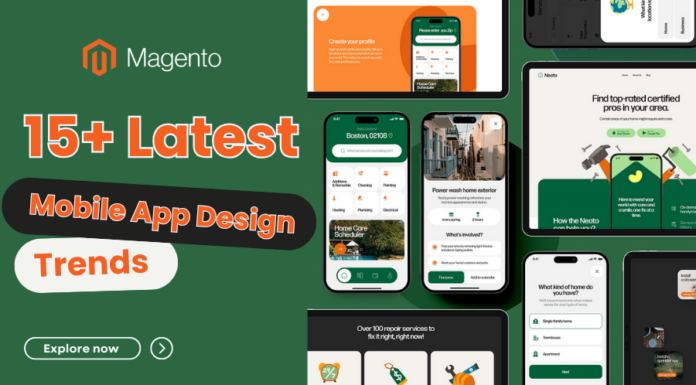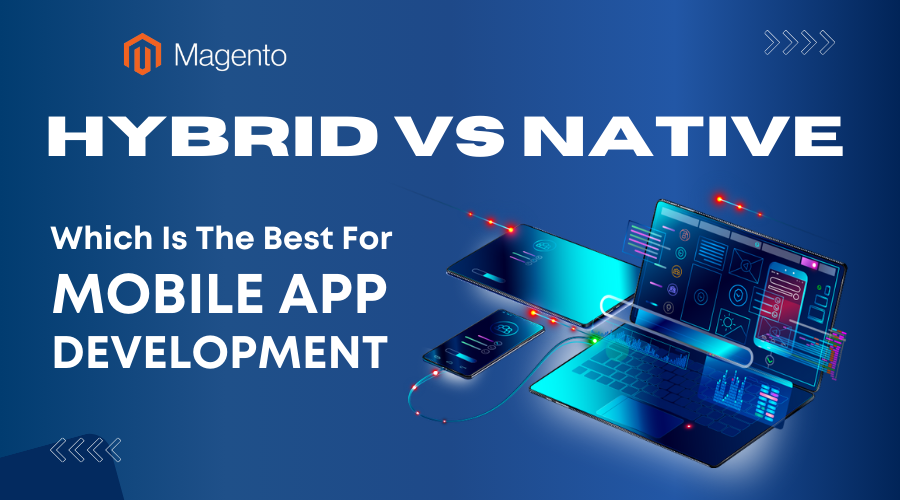
With mobile applications being the modern standard to connect with potential customers, businesses now depend on apps more than ever before. Consequently, the mobile app industry is on the rise, fulfilling people’s daily needs like banking, grocery shopping, and entertainment with convenience and prompt experience.
In the evolving domain of mobile app development, one decision defines the whole strategy and plays a crucial role in the success of these apps. Which approach is the most suitable: hybrid or native app development? As a business developer, you must think through a few considerations before developing an application. And whether or not to hire a hybrid app development company is one of them.
In this blog, we have compared the approach of native and hybrid app development for iOS and Android platforms.
Table of Contents
I. A quick overview of native app development
A native app uses a programming language tailored and dedicated to a specified platform like iOS or Android. With targeted and platform-specific tech stack, typically Objective-C or Swift for iOS and Java for Android, app developers can tap into the huge potential and unique in-built features of mobile apps.
Developed on technology specifically designed for operating systems, they ensure better features and functionality than the hybrid apps. Moreover, native apps can access the device’s hardware and software capabilities, like sensors and cameras, which will be challenging to integrate via hybrid or web application development.
What are the technologies used for Native App development?
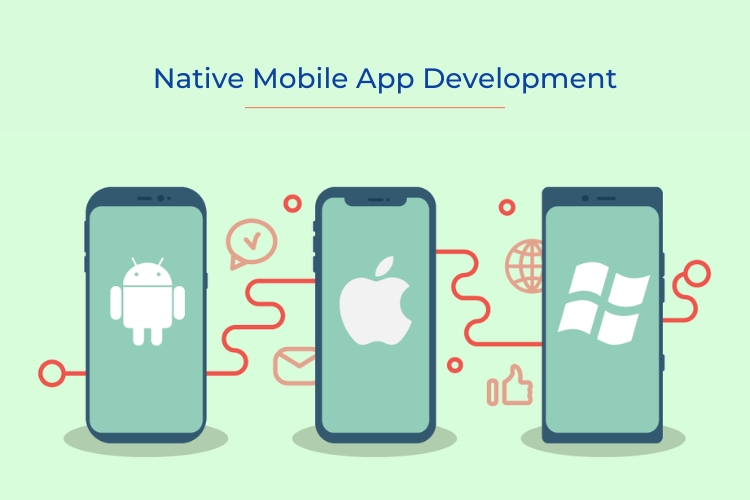
Native apps use web technologies (i.e: HTML, CSS, and JavaScript) to bring your idea to life quickly; moreover, with cross-platform frameworks (such as React Native, Ionic, and Flutter) readily available, developers have a wide array of options for hybrid app development.
| Tech stack | Used for iOS app development | Used for Android app development |
| Programming Languages | Objective-C and Swift | Kotlin and Java |
| Integrated Development Environment (IDE) | Xcode | Android Studio |
| UI/UX Design Tools | Sketch, Adobe XD, or Figma | Sketch, Adobe XD, Figma, or InVision |
| Version Control | GitHub, GitLab, or Bitbucket | GitHub, GitLab, or Bitbucket |
| Frameworks and Libraries | UIKit, SwiftUI, Cocoa Touch, Alamofire, Core Data, Firebase, Realm | Android Jetpack, Firebase, JUnit and Mockito, and Espresso |
| Testing Tools | XCTest, XCTestUI, XCUITest, Fastlane | |
| Build and Deployment Tools | Gradle and Android App Bundle |
II. A quick overview of hybrid app development
On the other hand, a hybrid app development strategy involves building an app for iOS and Android platforms simultaneously using web or cross-platform technologies. This approach allows developers to use a single codebase for all operating systems.
With a native app wrapper communicating with the native device platform and the web view, hybrid apps can run on mobile devices, accessing features like camera or GPS. Specific tools and technologies are used to streamline the communication between the web view and the native platform. Some of these platforms for compiling, building, and transforming your application into a successful application include React Native, Xamarin, and Flutter.
What technologies or frameworks are used for Hybrid app development?
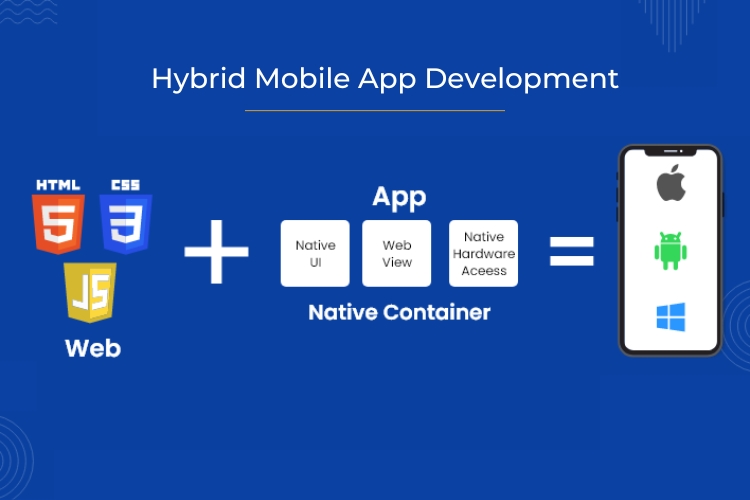
Hybrid apps use web technologies such as HTML, CSS, and JavaScript to bring your idea to life quickly. Moreover, with frameworks such as React Native, Ionic, and Flutter readily available, developers have a wide array of options for hybrid app development.
These frameworks offer versatile solutions tailored to various preferences and requirements. This diversity underscores the robustness of the hybrid app development ecosystem, addressing business needs effectively.
III. Hybrid vs Native app: Comprehensive comparison between two approaches
3.1. Why choose Hybrid app development?
- Develop apps faster
In hybrid app development, the cross-platform approach saves time and effort since only a single codebase is used to build and deploy apps for multiple platforms.
- Maintain a consistent user experience
With hybrid app development, you can provide a consistent user experience regardless of the platform used. This ensures a seamless experience for all users, making them feel more inclusive. However, you can customize the application as per your preference and platform demand.
- Easy to manage and scale applications
It is easy to develop, update, and maintain the codebase in hybrid app development since only one codebase handles code for multiple platforms. This also makes it easier to add features later in the development process.
- Saves cost
You do not have to establish a team separately for building iOS and Android apps, but need experts in web technologies. This also saves costs in the hiring and training process.
3.2. When not to choose Hybrid app development?
- May lack optimal performance criteria fulfillment
Hybrid apps may suffer from performance issues compared to native apps, especially when handling complex animations.
- Limiting capabilities
Accessing platform-specific features and functionalities may require workarounds, limiting the app’s capabilities.
- Depending on the plugins and libraries
The availability and quality of third-party plugins and libraries for hybrid app development may vary, leading to potential compatibility issues or dependency challenges.
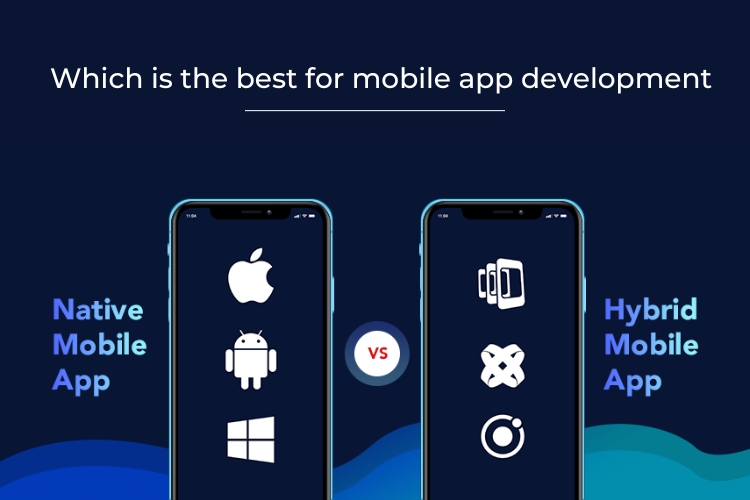
3.3. Why choose Native app development?
- Utilizing full potential of the Native platform
Native app development uses platform-specific languages like Swift for iOS and Java for Android, enabling developers to tap into the full potential of each operating system.
- Promises better performance compared to Hybrid apps
Offering better performance and user experience compared to hybrid apps, as they can leverage the unique features and functionalities of the underlying platform.
- Access devices built-in features
Access to device hardware and software capabilities, such as sensors and cameras, is seamless in native app development, ensuring enhanced functionality and user engagement.
- Performance optimization
Native apps can be optimized for performance and efficiency, resulting in faster loading times and smoother interactions, ultimately enhancing user satisfaction.
3.4. When not to choose native app development?
- Requires more time and cost investment
When developing native apps, it is required to code separately for each platform, which can lead to increased development time and cost.
- Complicated process to manage the application
Maintenance and updates for native apps may be more time-consuming and complex, as changes must be implemented separately for each platform.
- Difficult to find skilled professionals
Finding and hiring developers proficient in platform-specific languages like Swift and Java may be challenging, leading to potential resource constraints for businesses.
- Challenging to scale the application
Scaling native apps across multiple platforms may introduce challenges, as the development and deployment processes need to be repeated for each platform separately. This slows down the release cycle.
Also read: Hybrid App Development: A Complete Guide
Conclusion
As the number of mobile apps rises, businesses want to leverage this market quickly. Last year, i.e., 2023, it was predicted that the annual number of app downloads would reach 299 billion. This narrates the importance of implementing a decision-driven app development strategy to ensure an interactive application experience, generating high ROI. With the assistance of a reputed hybrid app development company, you can gain a competitive edge.
However, if you want your app to succeed, it is essential to clearly define your project requirements and app objectives to choose the suitable practice. You can implement the right approach with the defined target audience and their preferred platform, avoiding redundant investment and boosting user experience.
Author bio
Johany Wick is a Software Developer in Successive Digital responsible for creating, testing, and deploying complete web & mobile applications. We work with various technologies such as databases, web servers, and programming languages to create robust applications that are efficient and scalable.












![[SALE OFF] Discount 30% All Premium Extensions On Christmas And New Year 2025 christmas-and-new-year-2025](https://landofcoder.b-cdn.net/wp-content/uploads/2024/12/christmas-and-new-year-2025-1-218x150.png)




